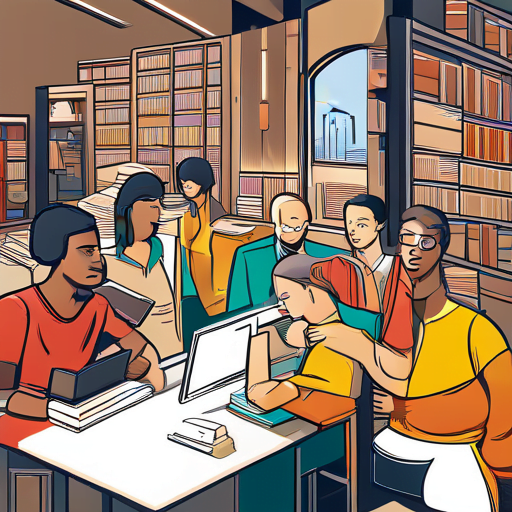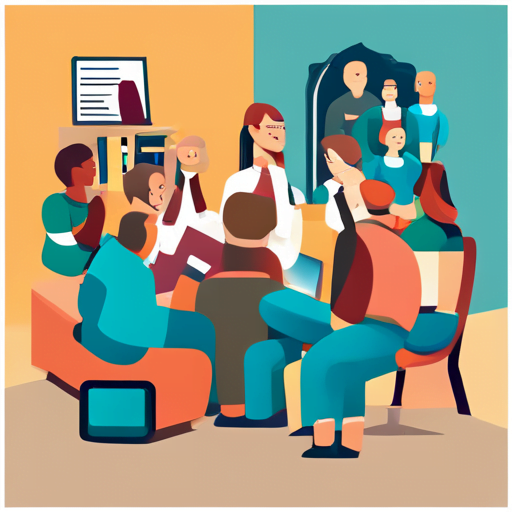As you sit at your desk, scrolling through articles and research papers on your laptop, you may wonder why physical libraries still exist in the digital age. After all, everything you need is just a click away, right?
But libraries play a crucial role in our society, providing access to information, building communities, offering educational support, and preserving history and culture. In fact, far from being obsolete, libraries are more important than ever in the digital age.
First and foremost, libraries ensure access to information for all. While the internet has made knowledge more accessible than ever before, not everyone has access to it. Libraries provide a level playing field, allowing everyone to access information regardless of their socioeconomic status.
Additionally, libraries often have resources that are not available online, such as rare books, manuscripts, and archives. By providing access to these resources, libraries ensure that knowledge is not lost to time and that future generations can learn from our past.
Table of Contents
Access to Information for All

You can easily access any information you need, regardless of your background or resources, thanks to the resources available at your fingertips. Libraries have always been a crucial resource for individuals to access information, but with the advent of the digital age, they’ve become even more important.
With the internet, it’s easy to access information, but not all information found online is reliable or accurate. Libraries have trained professionals who can help you find credible sources and navigate the overwhelming amount of information available online.
Libraries also play an essential role in providing access to information for all, including those who may not have access to technology or the internet at home. In many communities, libraries are the only source of free internet access, allowing individuals to apply for jobs, complete homework assignments, and stay connected with the rest of the world.
Additionally, libraries offer a wide range of resources, including books, magazines, and databases, that can be accessed for free, providing invaluable educational resources for people of all ages.
Moreover, by providing access to information, libraries play a vital role in promoting democracy. Informed citizens are more likely to take part in civic activities and make informed decisions, which is essential for a healthy democracy.
Libraries provide access to diverse perspectives, ideas, and opinions, which allows individuals to make informed decisions about their lives and their communities. In this way, libraries are not just repositories of information but also contribute to the overall health of our society.
Community Building

Get involved with your local library’s events and activities to connect with others who share your interests and hobbies. Libraries aren’t just places to check out books; they are community hubs that offer a variety of programs and events for people of all ages.
From book clubs and writing workshops to family storytimes and movie screenings, libraries provide a space for people to come together and engage in shared experiences. By participating in these activities, you have the opportunity to meet new people and form connections with others who have similar interests.
Libraries also offer a space for people to gather and work on collaborative projects. Many libraries have meeting rooms and study spaces that can be reserved by community groups or individuals. This allows people to come together and work on projects, such as group projects for school or business meetings. By providing a space for collaboration, libraries encourage community building and create opportunities for people to work together towards a common goal.
In addition to events and collaborative spaces, libraries also offer resources for community members to give back. Many libraries have volunteer programs that allow people to give their time and skills to support library programs and services. By volunteering at your local library, you can make a difference in your community while also connecting with others who share your passion for supporting literacy and education.
Overall, libraries continue to be important in the digital age because they provide a space for community building and engagement.
Educational Support

If you’re a student or someone looking to improve your skills, libraries can be a great resource for educational support. Many libraries offer homework help and tutoring services for students of all ages.
In addition, they often provide workshops and training programs to help you learn new skills. They also offer career counseling and job-seeking resources to help you achieve your professional goals.
Don’t hesitate to check out your local library for all the educational support you need!
Homework Help and Tutoring Services
Looking for extra support with your studies? Look no further than the homework help and tutoring services available at your local library.
Whether you’re struggling with a particular subject or need help with a specific assignment, the library has resources to help you succeed. Many libraries offer free one-on-one tutoring sessions with trained volunteers or staff members, as well as group study sessions and online resources like homework databases and academic journals.
Not only do these services provide valuable academic support, but they also promote a sense of community and collaboration. By working with others in a supportive environment, you can learn new study techniques, get feedback on your work, and build relationships with peers who share your interests and goals.
So next time you’re feeling overwhelmed by schoolwork, don’t hesitate to take advantage of the homework help and tutoring services at your local library.
Workshops and Training Programs
You can level up your skills and knowledge with the workshops and training programs available in this section, so why not explore what’s on offer?
Libraries have always been known as a place for learning and self-improvement, and they continue to fulfill that purpose even in the digital age. With the rise of new technologies and constant changes in various industries, it’s essential to keep yourself updated and equipped with the latest skills and knowledge.
Fortunately, libraries offer a wide range of workshops and training programs to help you do just that. Whether you’re a student, a professional, or just someone who wants to learn something new, libraries have something for everyone.
From computer classes to writing workshops, from language learning to job training, you can find a variety of programs that cater to your interests and needs. These workshops and training programs not only provide you with valuable knowledge and skills but also give you the opportunity to connect with others who share your passion for learning.
So, don’t hesitate to explore what your local library has to offer and take advantage of these resources to enhance your personal and professional growth.
Career Counseling and Job-Seeking Resources
Don’t miss out on the valuable career counseling and job-seeking resources available in this section – they could be the key to unlocking your dream job and achieving your goals.
Many libraries offer assistance with resume writing, cover letter creation, and interview preparation. They may also have access to job databases and job fairs, helping you to stay informed about the latest employment opportunities. Additionally, libraries often provide free access to online resources such as LinkedIn Learning, which can help you to develop new skills and improve your marketability as a job candidate.
Libraries can also be a valuable resource for those who are considering a career change or seeking additional education or training. Many libraries offer workshops and classes on topics such as entrepreneurship, small business development, and continuing education. They may also have partnerships with local colleges and universities, providing access to resources such as research materials and academic advisors.
By taking advantage of these resources, you can gain the knowledge and skills you need to succeed in your chosen field.
Preservation of History and Culture

Preserving the history and culture of our society is crucial, and you can experience the value of it by exploring the vast collection of valuable resources available at your local library. Libraries are the guardians of our past, and they play a vital role in preserving our cultural heritage.
They provide a safe space for historical documents, rare books, and other artifacts that tell the story of our society. Without libraries, much of our past would be lost, and we would be unable to learn from the mistakes and successes of those who came before us.
Libraries are not only repositories of knowledge but also places where cultural heritage is celebrated and shared. They provide access to local history collections, genealogy resources, and special collections that are unique to a particular area.
By visiting your local library, you can learn about the history and culture of your community and gain a deeper understanding of the people who lived there before you. You can also experience the joy of discovering something new and unexpected, such as a rare book or an old photograph.
In today’s digital age, it is easy to forget the importance of preserving our history and culture. However, libraries continue to play a crucial role in this process, as they are equipped with the resources and expertise to protect and share our cultural heritage.
They are more than just buildings with books; they are community spaces that bring people together and celebrate the richness of our past. So, next time you visit your local library, take a moment to appreciate its role in preserving our history and culture, and remember the importance of supporting this essential institution.
Frequently Asked Questions
How can libraries adapt to the changing needs of the digital age?
To adapt to the changing needs of the digital age, libraries must prioritize technology and digital resources.
This means offering e-books, online databases, and digital archives. Libraries must also provide access to technology, such as computers and Wi-Fi, to ensure everyone in the community has the opportunity to use these resources.
In addition, libraries must focus on creating a welcoming and inclusive space for all patrons, including offering programming and services that meet the needs of diverse populations.
By embracing technology and creating welcoming spaces, libraries can continue to serve as valuable community resources in the digital age.
What impact do library closures have on disadvantaged communities?
If you live in a disadvantaged community, library closures can have a significant impact on your life. Without access to libraries, you may not have a safe and quiet place to study or do homework. You may not have access to computers, internet, or technology that can help you succeed in school or find a job.
Additionally, you may miss out on valuable educational and cultural resources that can enrich your life and broaden your horizons. Library closures can also exacerbate existing inequalities, as those who can afford to buy books and access other resources online may have an advantage over those who cannot.
Therefore, it’s crucial to ensure that libraries remain open and accessible to all, especially in disadvantaged communities.
How are libraries addressing issues of digital literacy and access?
Are you struggling to keep up with the increasingly digital world around you? Libraries are here to help.
Many libraries are now offering resources and classes to help patrons improve their digital literacy skills, from basic computer skills to coding.
Additionally, libraries are working to bridge the digital divide by providing access to technology and the internet, especially in disadvantaged communities where access may be limited.
By addressing these issues, libraries are not only fulfilling their traditional role as a source of knowledge and information, but also as a vital community resource in the digital age.
What role do libraries play in promoting diversity and inclusion?
Looking for a place that promotes diversity and inclusion? Look no further than your local library.
Libraries play a vital role in creating a welcoming environment for all members of the community. They serve as a safe space where people of different backgrounds can come together and learn from one another.
Libraries offer a variety of resources, from books to classes to events, that celebrate diversity and challenge stereotypes. By promoting inclusion, libraries help build a stronger, more connected community.
So, whether you’re looking for a good book or a chance to connect with others, head to your local library and see for yourself how it’s promoting diversity and inclusion.
How do libraries balance the need for preservation with the demand for modernization?
If you’re wondering how libraries balance the need for preservation with the demand for modernization, it’s important to understand that it’s a delicate dance.
Libraries have a responsibility to preserve historical artifacts and materials, but they also have to adapt to changing technologies and user needs. One way they do this is by digitizing their collections, which not only preserves them for future generations but also makes them more accessible to a wider audience.
However, libraries also recognize the importance of physical materials and continue to acquire and maintain them. It’s all about finding the right balance between tradition and innovation.
Conclusion
So, why are libraries still important in the digital age? The answer is simple. Libraries provide access to information for all, build communities, offer educational support, and preserve history and culture.
They offer a safe and welcoming environment for people to learn, explore, and connect with others. In today’s fast-paced and technology-driven world, it’s easy to forget the importance of physical spaces to gather, learn, and share knowledge.
But libraries are more than just buildings filled with books. They are places where people of all ages and backgrounds can come together to learn, grow, and connect with others. So, the next time you have a question or need a quiet place to study, remember that your local library is there to help you.
